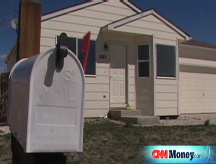Many problems with mortgage bailouts
There are calls for the government to help homeowners at risk of foreclosure. But some experts think a mortgage rescue could cause more problems than it solves.
| 30 yr fixed | 3.80% |
| 15 yr fixed | 3.20% |
| 5/1 ARM | 3.84% |
| 30 yr refi | 3.82% |
| 15 yr refi | 3.20% |
NEW YORK (CNNMoney.com) -- Congress appears eager to help more than a million homeowners facing foreclosure, but a proposal aimed at fixing the battered housing market could instead end up as the latest blow to a recovery.
An ambitious plan proposed by Rep. Barney Frank and Sen. Chris Dodd calls for up to $300 billion in loan guarantees from the Federal Housing Administration to refinance loans that homeowners can't afford as long as the original lender reduces the principal on the loan to 85% of the home's current market value.
Backers say borrowers would get out from under unworkable debt and original lenders would get back more than they would foreclosing. It would also prevent 1.5 million foreclosures and halt home-price declines since it would keep more houses from flooding an already battered market.
Critics, including some in Congress, say the rescue plan rewards reckless behavior and transfers risk to homeowners and lenders who were responsible during the housing boom.
But some experts think this is the wrong solution for purely financial reasons.
The plan won't work
Robert Shiller, a Yale economist who has long argued there was a bubble in home prices, thinks the plan will do little to stop the slide in housing prices.
The runup earlier this decade, fed by low interest rates from the Federal Reserve and lax underwriting standards by lenders, created a bubble that hasn't yet completely deflated.
Shiller notes that prices shot up 85% when adjusted for inflation from 1997 through mid-2006 and have fallen only about 15% since then.
Shiller adds that when compared to measures such as rents and household income, housing prices are still out of equilibrium
"I'm not sure we can achieve continuing high home prices," he said.
If he's right, more borrowers may find themselves owing more than their house is worth, which could add to the number of foreclosures and homes on the market.
In addition, the FHA would be left with a large portfolio of loans backed by houses worth less than the mortgage. In other words, instead of banks facing foreclosure risk, the government (and hence taxpayers) would be on the hook for billions of dollars in bad loans.
And the FHA is already strapped. The agency's estimated losses are already soaring and the FHA has been warning Congress it might no longer be able to count on premiums paid by borrowers to cover its losses.
Housing prices should be falling
Not everyone agrees with Shiller. Some think the Dodd-Frank plan will at least slow the decline in home prices. Problem is, that could ultimately be bad news for the economy too. That's because some think that, as painful as it may be, the best way to fix the housing crisis is for the free market to run its course.
After all, lower home prices might actually help stimulate demand again.
"What the market is in the process of doing is bringing home prices back to where they should be by any traditional measure," said Barry Ritholtz, CEO and director of equity research Fusion IQ. "If home prices don't go down, it means newlyweds can't go out and find a home they can afford."
The Bush administration seemed to be worried about just this kind of impact when the Dodd-Frank bill was first proposed.
"We must work to limit the impact of the housing downturn on the real economy without impeding the completion of the necessary housing correction," said Treasury Secretary Henry Paulson in a speech last month.
And Keith Hembre, chief economist of First American Funds, also is concerned that other efforts by the government to respond to problems in housing, including the Federal Reserve's recent move to accept mortgage-backed securities and collateral from lenders, will create more problems than they solve.
"Fixing the prices of one asset will distort the price of others," he said, adding that the Fed's actions could lead to inflation in other parts of the economy, as the Fed's efforts to inject money into the troubled credit markets could lead to an even weaker dollar and higher commodity prices, which would feed price pressures down the road.
There should be more renters
William Wheaton, a professor with the Massachusetts Institute of Technology's Center for Real Estate, says one quiet shift that occurred during the housing boom was that more homes and apartments went from being rental units to being owner-occupied.
Wheaton argues many of the homeowners now facing foreclosure could be better off renting the same home at current market prices, rather than trying to refinance the mortgage.
He adds that if there isn't a significant increase in the supply of homes for rent, rents will rise, which will just make things more difficult for those who do lose their homes.
For this reason, he thinks the government would be better off giving tax assistance to companies willing to buy foreclosed properties and then rent them to the current occupants.
"That could be just as good if not better for housing market, because it would also keep the foreclosed homes off the market, and limit the damage to house prices while also preventing rents from soaring," he said.
But Wheaton admits that such a move probably has little political support in Congress because politicians want to be seen as doing what they can to promote and preserve home ownership, even if people better off paying less in rent for a comparable home than they're now paying to own a home.
"It's very popular to say you're in favor of home ownership, even if it doesn't make any economic sense," he said.
How is the economy affecting your everyday life? Tell us about how your money situation has changed - or stayed the same - in the last few months. What's your biggest economic worry? Send us your photos and videos, or email us and share your story. ![]()




